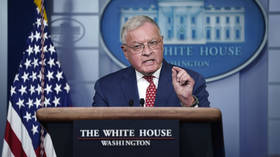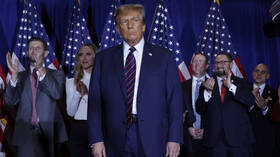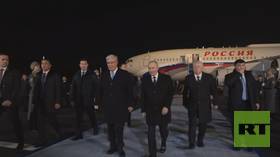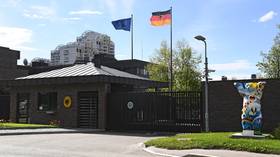India and China reach out to common friend Russia as deadly border conflict still raw
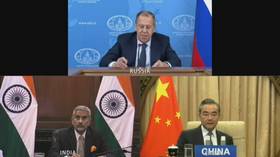
Days after India and China engaged in a bloody border confrontation, Russia, a common strategic partner to each, is this week playing host to the two sides. Can Moscow influence the outcome of their dispute?
The Russia-India-China (RIC) trilateral foreign ministers’ virtual meeting yesterday, hosted by Russian Foreign Minister Sergei Lavrov, was the first time that India’s External Affairs Minister S Jaishankar and Chinese Foreign Minister Wang Yi had spoken face-to-face since the recent military confrontation – now in the process of disengaging – along the Line of Actual Control, the de facto India-China boundary.
Reportedly, Jaishankar and Wang had an angry phone exchange just days ago over the border clashes, in which 20 Indian soldiers were killed.
The RIC meeting yesterday skipped over the border dispute, focussing instead on common global issues, such as United Nations reforms. Importantly, Russia once again endorsed India for a permanent seat on the United Nations Security Council, a stand opposed by China.
Significantly, besides the virtual meeting of the three RIC foreign ministers, India’s Defence Minister, Rajnath Singh, and his Chinese counterpart, Wei Fenghe, are also in Moscow. On Wednesday they attended the Victory Day parade there, where Indian and Chinese military contingents marched together.
Russia – a common strategic partner
While tensions between India and China over the border are not new, the fact that both sides have reached out to Moscow is an interesting development. Russia, which has maintained close strategic ties with both New Delhi and Beijing, had expressed alarm over the eruption of violence at the border.
The Russian presidential spokesperson stated that both China and India were Russia’s close partners and allies, having “very close and mutually beneficial relations (with Russia) built on mutual respect,” highlighting that both were capable of dealing with the situation, and suggesting that Russia did not wish to take sides – and a subtle political message to Beijing.
It is noteworthy to recall that, during the 1962 Sino-India border war, caused by a similar escalation in border clashes, the then Soviet premier Nikita Khrushchev chided Chairman Mao Zedong over the confrontation.
Evidently, China was enraged by the support their fellow Communists gave the Indian Prime Minister Nehru and their calls for "peaceful negotiation" between the two sides. Equally evident is that this squabble was an important factor that eventually resulted in the Sino-Russia split during the height of the Cold War in the 1960s, and led to the subsequent China-US rapprochement.
Also on rt.com The last time someone died in India-China border clashes, it was WARWhy Russia is preferred over the USA
Russia’s neutral position on the Sino-Indian dispute contrasts with the stance taken by the United States. In May, President Trump extended his support to New Delhi to negotiate with China, stating he was “ready, willing and able to mediate” between the two Asian neighbors, an offer that was rejected by both Beijing and New Delhi. In any case, such an attempt would have been futile, due to the inherent and growing mistrust in US-China ties.
The US has also been engaged in stitching together an anti-China coalition by expanding the G7 forum to include Russia, India, South Korea and Australia. Pertinently, in 2014 Moscow parted ways with the group and, faced with Western sanctions, sought to build closer strategic relations with Beijing. So Trump's outreach to Russia could be a cause for concern for China.
India’s wide-ranging strategic relationship with Russia – dating back to the Soviet era and China’s evolving quasi-alliance with Russia – has positioned Moscow as a credible and influential partner capable of influencing Sino-Indian relations, even though Russia may not have the same degree of influence over China as it did in 1962.
Significantly, China is Russia's largest energy trading partner and investor, and both countries have agreed to develop bilateral trade – forecast to touch $200 billion by 2024 – using the Ruble and the Yuan.
For China, which is facing global criticism over its handling of the Covid pandemic and has found no support over the border clashes with India, backing from Russia could be crucial at this juncture.While, for India, which has long relied on Russian military hardware, uninterrupted arms supplies are vital to prepare for possible contingencies with China.
In fact, the Indian defense minister is expected to this week discuss the supply of the Russian S-400 missile defense system – that is likely to be deployed along the China-India border – and a need to expedite spares for its existing Sukhoi and MiG fleets. Crucially, India will also seek to obtain an assurance from Russia that Indian supplies will not be impacted in the changing political and security environment.
Thus, with both India and China dependent upon Russia, it is clear that Moscow has an important role to play in shaping the outcome of the Sino-Indian border dispute. And, given Russia’s strategic interests in both countries, it is expected that the border tensions could be brought under control soon.
Think your friends would be interested? Share this story!
The statements, views and opinions expressed in this column are solely those of the author and do not necessarily represent those of RT.




